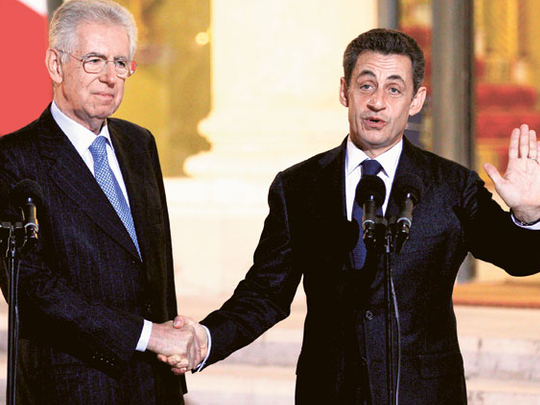
Paris: Italy and France sought to present a united front on Friday as grim economic news threatened to push Europe back into recession and exacerbate a spiralling debt crisis.
European leaders are scrambling again to stem the march of the crisis, which pushed the euro to a 16-month low against the US dollar on Friday, drove Italy's borrowing rates to unsustainable levels and is threatening France's prized AAA credit rating.
With the debt jitters regarding core economies, economic indicators show that even powerhouse Germany hasn't been spared. Economic sentiment and retail sales are falling across the region, according to new data released on Friday, while unemployment in the 17-nation Eurozone is stuck at 10.3 per cent.
For already struggling countries like Hungary, which is not in the Eurozone, a weaker regional economy is spelling disaster. The credit rating of the country, which has requested help from the European Union and the International Monetary Fund, was downgraded to junk status on Friday. European governments are trying to regain investors' confidence in their public finances, but doing so will be all the more difficult as their economies slow down or contract. There are also signs of splintering in their pledges to forge closer fiscal ties to calm markets.
So French President Nicolas Sarkozy and Italian Prime Minister Mario Monti stepped up on Friday to reassure investors, vowing they saw eye-to-eye on how to resolve the crisis and promising coordinated action.
"Italy and France share a perfectly identical view on the future of Europe and the way to solve the crisis of confidence," Sarkozy told reporters after their meeting.
Budget cutting
Monti, meanwhile, urged other countries to fulfill the promises they've made.
"In a situation so delicate for the EU and the Eurozone, we agree... that each member state has to do what's necessary in terms of budget cutting and reform," Monti said. "It is essential that all the member states work together on the same level."
Monti became prime minister late last year after worries that Italy couldn't pay off its debts pushed its yield past seven per cent — a level that eventually forced other countries to seek bailouts.
His technocratic government was meant to carry out stringent austerity measures aimed at reassuring investors and hopefully bringing Italy back from the brink. Europe cannot afford to rescue Italy as it has smaller economies.
Stocks and bonds mostly fell on Friday, while the euro dropped as low as $1.2681 (Dh4.65), its weakest since early September 2010.
France, whose bond yields have also been rising steadily, though less dramatically than Italy's, faces the loss of its prized AAA credit rating. Any downgrade would have far-reaching consequences for Europe since Paris' credit rating is one of the bedrocks of the continent's bailout system.
At a recent summit aimed at ending the crisis, European leaders pledged to hand sweeping powers over to Brussels, giving bureaucrats the power to send back irresponsible national budgets for revision. The routine violation in the past of European rules on overspending is partially responsible for over-indebtedness.
Analysts have warned that the proposals don't go far enough, and divisions over them have already begun to crop up.
Poland's finance minister said on Friday that such plans for closer ties among the countries that use the euro need democratic legitimacy before they can be put in place.
In the interest of calming financial markets — which can't wait for the kind of messy parliamentary votes and national referendums that have dogged the EU in the past — leaders pledged to sign up to tighter integration at the summit. But many question whether such sweeping powers can be handed over without some kind of consultation with European citizens.
Finance Minister Jacek Rostowski told a conference in Paris that tighter Eurozone integration is necessary, but that before vast powers are handed over to the EU executive, European citizens must have a say. "For something that far reaching as far as national sovereignty to be accepted then there would have to be some form of deep democratic legitimisation," he said. "That would either require a co-decision with European Parliament or a majority of national parliaments or something like that."
Although the crisis has focused largely on the Eurozone countries, financial turmoil was also growing on its fringes, in Hungary.
italy ten-year yield up
While Monti was initially greeted with relief, the pressure is rising again. The yield on Italy's ten-year bond rose above seven per cent again on Friday, adding urgency to Monti's drive to pass the promised austerity measures.
In a sign of the increasing focus on Italy's problems, Sarkozy said he and German Chancellor Angela Merkel — who as leaders of the biggest economies in the Eurozone have led much of the crisis response — would travel to Rome on January 20 to prepare for Eurozone meetings at the end of the month.
— Tagline












